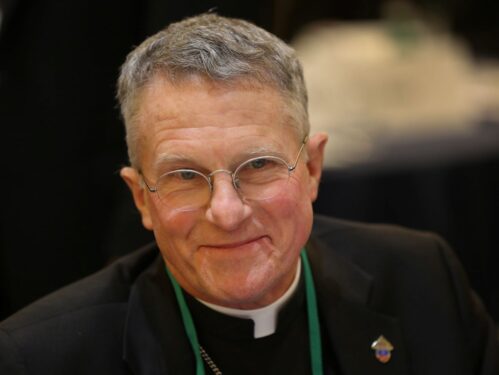
BALTIMORE — The newly elected United States Conference of Catholic Bishops president, Archbishop Timothy Broglio, said he intends to continue the work of his predecessor, Archbishop José Gomez, in fostering unity among the bishops.
“Basically, I intend to continue the good work that Archbishop Gomez began … by giving us a good example of listening, but then also an example of leading,” Archbishop Broglio said at a news conference following his election. “I think that the bishops have made great strides working together and talking to one another, and so hopefully, this process will continue.”
Speaking with The Tablet after the public session, the conference’s new vice president, Archbishop William Lori of Baltimore, echoed the sentiment that unity among the bishops is paramount to the success of the Church.
“[Unity] has always been critical, but the importance of it is highlighted in a very polarized culture and in a culture that challenges the unity of the church itself,” Archbishop Lori said. “I don’t think that coming together in unity can be overemphasized. We can never stop finding our unity in the Holy Spirit, who enables us to encounter the person of Christ and to be rooted in his love.”
The election of Archbishop Broglio and Archbishop Lori to lead the USCCB for the next three years was the big news out of last week’s fall general assembly.
Archbishop Broglio, head of the Archdiocese for the Military Services, led each round of voting in a crowded 10-candidate field but didn’t break the majority threshold of 119 votes until the third round when he garnered 138 votes. Archbishop Lori — who was elected conference vice president soon after — was second in the presidential vote with 99.
Archbishop Broglio didn’t give a formal address to the conference after the election. He did, however, thank Archbishop Gomez, conference vice president Archbishop Allen Vigneron of Detroit, and conference treasurer Bishop Gregory Parkes of St. Petersburg, Fla., for their three years at the helm.
Excluding Archbishop Broglio and Archbishop Lori, the other presidential candidates were Bishop Michael Burbidge of Arlington, Bishop Frank Caggiano of Bridgeport (formerly a Brooklyn auxiliary bishop), Archbishop Paul Coakley of Oklahoma City, Archbishop Salvatore Cordileone of San Francisco, Archbishop Paul Etienne of Seattle, Bishop Daniel Flores of Brownsville, Archbishop Gustavo García-Siller of San Antonio, and Bishop Kevin Rhoades of Fort Wayne-South Bend.
Archbishop Broglio also said he would welcome the opportunity to meet with President Joe Biden and denied that his election is a sign of “dissonance” between Pope Francis and the U.S. bishops.
Archbishop Gomez of Los Angeles, as USCCB president, wasn’t given the opportunity to meet with Biden, a Catholic, whose pro-abortion stance has made for a turbulent relationship between the Oval Office and USCCB in recent years.
“I know that there has been a great desire on the part of [Archbishop Gomez] to meet with the president, and that hasn’t been possible,” Archbishop Broglio said. “If it’s possible in the future, I’ll certainly take advantage of that. If he wants to meet with me, I’d be happy to meet with him.”
Answering a question on how he’ll operate in the political arena, he added that he looks forward to possible conversations with U.S. political leaders and that he wouldn’t miss “any chance to insert the gospel into all aspects of life in our country.”
In other comments, Archbishop Broglio denied his election indicates “dissonance” with Pope Francis as some commentators have suggested, saying he’s “certainly in communion with Pope Francis as part of the universal Church” and they are “brother bishops.”
Archbishop Broglio was also asked about his time as Cardinal Angelo Sodano’s secretary from 1990-2001 and how that experience forms the way he views issues of clerical sexual abuse in the Church. Cardinal Sodano, who died earlier this year, was the Vatican Secretary of State under Pope John Paul II and Pope Benedict XVI, who repeatedly defended and covered for then-Father Marcial Maciel Degollado, the founder of the Legion of Christ, who a Vatican investigation found committed a wide range of sexual abuse and other forms of misconduct.
Archbishop Broglio answered that “hindsight is always 20/20,” noting that he didn’t work in Cardinal Sodano’s office when the accusations against Father Maciel surfaced. He said those circumstances are always a good reminder that the church has to be “attentive” and “proactive.”
Archbishop Broglio has led the Archdiocese for the Military Services since 2008.
He has held a number of leadership roles within the USCCB over the years. His election to be the next conference president cut short his time as conference secretary. In the past, he has served as chairman of the USCCB Committee on International Justice and Peace as well as chairman of the Canonical Affairs and Church Governance Committee.
